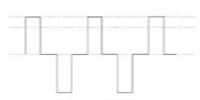What is it?
Modified sine power inverter is an inverter (electronic device) which transforms the current from a DC to AC and puts out a modified current wave similar but not identical with the one in a house grid. (see the picture below). There are many types of inverters of this kind, customised based on different countries house grid voltages for example if you live in Australia you would buy a 240v output, most of Europe and China 220v in UK 230v, in US 110v.

modified sine wave
How does it work?
The current produced by this standard power inverter will be similar but not perfectly identical with the one you use at home.
It needs to be connected to a battery or a battery bank as an input, from there it transformes the current from DC to AC and creates a wave similar but not identical with the house grid current wave. It has an output, usually looks similar with a power point where you can connect appliances.
Note! Not to be used if you intend to export power from a power supply (battery, solar panel, wind turbine) to your house grid as they are not electronically ready to export power. If you connect it to a power point, instead of the current that you produced to export to the grid, the actual current from your power point will try to travel into your inverter and will without a doubt blow up. In order to export the power that you produce to the grid, there is a Grid Tie Inverter (GTI) made for this process.
You can notice the difference in some fine electronics like TV, radio, some lighting, etc. If you intend to use it for this fine electronics I would not suggest this product as it can do some damage in a long term, but I would suggest a pure sine inverter.

